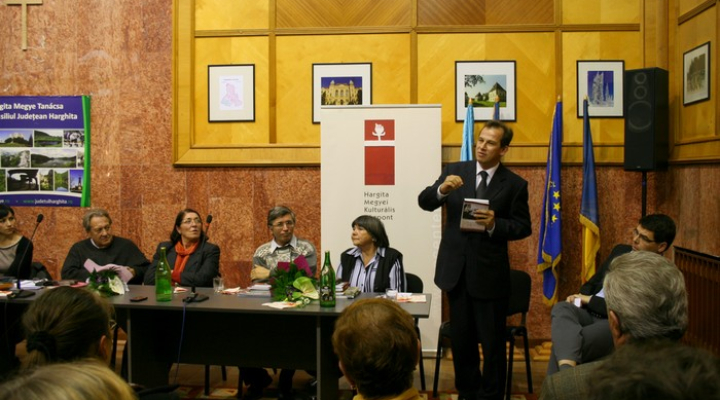The tenth annual Csángó Day in Miercurea Ciuc
The event promoting Csángó culture has reached its tenth annual edition in Miercurea Ciuc. Its theme was the Hungarian literature in Moldova, given the 100th anniversary of the birth of the first well known Csángó poet, Demeter Lakatos. At the event, MEP Csaba Sógor presented a publication he mentored about the situation of the Csángós in Moldova entitled „We like to live here”.
The event co-organized by the Harghita County Cultural Center and the Harghita County Council started on the 13th of November with a festive sermon, followed by the literary production of Csángó children studying in Miercurea Ciuc. This year organizers strived to put emphasis on the results of the work being done to preserve Csángó culture, instead of the difficulties surrounding language education in the region.
First, ethnographer Péter Halász presented the work of Demeter Lakatos and mentioned other contemporary authors such as Mária Petrás, Felicia Gábor, Miháyl Perka and Mihály Laczkó, who did not have the opportunity to be present at the festivities but have attention worthy achievements.
Literary critic Gábor Farkas praised the works of Moldavian Csángó authors and highlighted the values of Csángó literature. Following this, attendees had a chance to personally meet writer and poet András Duma, poet Laura Iancu and ethnographer Tinka Nyisztor. The meeting was conducted by Professor Erzsébet Borbáth who considers promoting Csángó customs and encouraging Csángó young people to assume their identities to be her main task. In her remarks, Tinka Nyisztor emphasized the importance of use of minority languages in churches, saying that those who have forgotten their mother tongue can no longer communicate with God. András Duma said thanks to Miercurea Ciuc for being the most open city for young Csángó people to come to study. Laura Iancu declared that being of Csángó ethnicity is a christening that cannot be washed off, neither will she try to do so.
MEP Csaba Sógor who is an avid supporter of the Csángó cause, also attended the event. Although last year he only spoke about the plans for the book in three languages on the Csángós entitled “We like to live here”, this year he presented the book that has already been officially presented in Brussels.

“I’ve published this book because I am confident that politicians who read it will remind Romanian politicians that the 1521/2001 Recommendation of the Council of Europe in protection of Csángó culture is more than a simple appeal and cannot be overlooked” – he explained. As a reminder, Csaba Sógor presented the chapter of the book that deals with the 2006 report of the presidential committee for analysis of the communist regime. – Even though it has been forgotten, back then President Traian Basescu acknowledged before Parliament that the attempt to rob the Csángós of their linguistic identity has had dramatic consequences, but nothing has changed since – the MEP said.
In his closing remarks Csaba Sógor reminded that the 13th of November is now officially the Day of the Hungarian Language and quoted the famous thought of Dezső Kosztolányi: “… our peasants believe that he, whose death is being gossiped, shall live a long life. It seems that this is true in the case of nations and languages as well”.
Hungarian General Consul in Miercurea Ciuc Barna Pál Zsigmond also attended the event and reminded about the chapter about Csángós in the new Citizenship law of Hungary. He said that unity is needed both in the political and civil spheres in order to better promote the culture of the Csángós. President of the Harghita County Council Csaba Borboly stressed the responsibility of Szeklerland towards Hungarians living in the Diaspora: we, Hungarians living in Szeklerland, need to give up our subsidies for culture in favor of those Hungarians living in the Diaspora and Moldova because they need larger support in maintaining their identity – he said.











